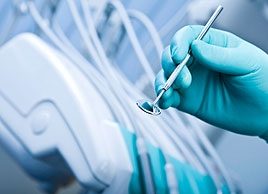5 questions to always ask your dentist
Find out how to get the most out of your dental visit with these questions you should always ask your dentist, plus things to keep in mind during your kids’ dental visits

When we think about issues of health and prevention, often we don’t think of our teeth. But maintaining oral health is essential to averting trouble down the road: the prospect of icky-looking gums, losing teeth in midlife, chronic bad breath or even worse health conditions is not a pretty picture.
Just as you talk and share health concerns with your doctor, it’s important to maintain a dialogue with your dentist. After all, dentists are doctors, too. ‘They’re experts in the area between the top of the neck and below your eyes,’ says Ottawa dentist Dr. Don Friedlander, who is also the president-elect of the Canadian Dental Association. ‘You should be getting a medical exam from your dentist for that area.’ Here are Dr. Friedlander’s top picks for questions to always ask your dentist.
1. What can I do to improve my dental health?
Everyone’s mouth is different, and you might need to do more than the general guidelines of brushing after meals and flossing daily. Dentists can give you this customized information. They can advise you on whether you need to brush more often or switch to a different toothbrush, or if you need a refresher in flossing. They can tell you whether you need to increase or decrease your fluoride intake, and how often you need to come in for a visit. Don’t feel silly asking your dental professional about new products you’ve seen advertised, and whether they could help you, or are a waste of money. They may even have samples you can try.
2. What can you do to improve my dental health?
Whether it’s night guards for teeth grinding or treatment for bad breath, your dentist can help you optimize the health of your mouth. But remember, your dentist is not a mind reader. In order to provide you with the latest in oral care, they need to know about any problems you’re experiencing‘even if they seem minor at the time. Telling your dentist about any pain, discomfort or abnormalities means that they can come up with solutions that can improve your daily comfort and even prevent bigger problems from occurring later on.
3. What’s my overall dental health status?
You can ask your dentist to give you a general exam for the mouth area, which includes looking for any lumps or bumps that don’t belong; gauging bone density, especially if osteoporosis is a concern; or checking for inadvertent teeth grinding. They can make sure everything is functioning properly and, if it isn’t, can begin the discussion on treatment options.
4. Is there anything that I should tell my family doctor about?
There is a range of health problems that begins in the mouth. Changes inside your mouth can signal certain conditions, such as vitamin deficiencies or osteoporosis; inflamed gums can be an indicator of diabetes. Your dentist can make you aware of which symptoms should be brought to your GP’s attention.
5. Is there anything you need to know from my family doctor?
Your dentist should be advised about any changes in your overall health status. For instance, sudden complications in your mouth could be because of medications you’re taking or related to health changes or conditions elsewhere in your body.
For children, keep in mind some additional questions for the dentist.
‘ What advice can you give me about nutrition as it relates to my child’s oral health? (Remember, your dentist can gauge for such things as nutritional inadequacies or whether a baby bottle at night is affecting good growth.)
‘ How are the teeth developing and, if there are any problems, is there anything I can do about it now to avoid orthodontics later?
‘ How can I ensure my child’s teeth are clean?
‘ Do you have any advice on how to get my child to brush their teeth?
‘ How can I reassure my child for his or her first visit?
For upcoming procedures, go over this checklist of questions with your dentist:
‘ What side effects can I expect?
‘ What kind of anesthesia will be used, general or local? How do I prepare in advance for it and how can I expect to feel immediately afterward? Will I need assistance in getting home?
‘ Are there any alternative treatments and, if so, what are their pros and cons?
‘ How long will it take and will there be any pain afterward?
‘ Is there any special care needed for my teeth after the procedure and, if so, for how long?
‘ Will there be any follow-up procedures, and how many appointments can I expect this to entail?
‘ Should we take before and after photos?
Don’t miss out! Sign up for our free weekly newsletters and get nutritious recipes, healthy weight-loss tips, easy ways to stay in shape and all the health news you need, delivered straight to your inbox.




